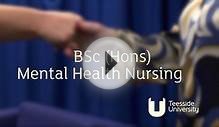
Studies Mental Health Nursing
Equal consideration is given to all applications received at UCAS by 6.00pm on 15 January. Details of all UCAS deadlines can be found on the UCAS website www.ucas.com.
UCAS will accept applications up to 30 June, but we can only consider these if there are still vacancies in relevant subjects. You are advised to check with the University before applying for popular courses which may already be full. Candidates applying for any courses after early September must follow the UCAS Late Registration Procedure, and we will provide the appropriate form.
Decision Making Process
When we receive your application it will be forwarded to the Admissions Tutor who will consider your application in accordance with the University’s Admissions Policy.
Most subject areas do not require applicants to attend an interview as part of the selection procedure. However, if the standard procedure is to interview candidates, this is specified in the degree programme entrance requirements. Some courses, such as Health, Social Work and Teacher Training, require specific checks or requirements to be put in place during the normal selection process. These are detailed on the individual course details pages.
Fairness and Transparency
The University is committed to a system of admissions that ensures fairness, transparency and equal opportunities within the legal framework of the UK and best practice. All reasonable effort will be made to ensure that no prospective or existing student is unreasonably treated less favourably on the grounds of age, race, colour, nationality, ethnic origin, creed, disability, sexual orientation, gender, marital or parental/carer status, political belief or social or economic class, or any other type of discrimination.
What Happens Next
You will receive one of the following from UCAS or our Admissions Office:
- Conditional offer which depends on you achieving certain grades from forthcoming examinations, completing relevant checks, or other requirements prior to entry. You may be asked to send us a copy of your certificates/qualifications once these have been received to enable us to confirm your offer. Not all examination results are sent to Universities via UCAS.
- Unconditional offer if you have already satisfied entry requirements.
- Reject your application.
Tuition Fee Assessment
Tuition fees are set at different levels for Home/EU and International Students. Before you begin your course the University must establish your tuition fee status. In many cases, the University will be able to make this assessment without requiring any additional information.
Selection Process
Interviews
Applicants who may not have the standard entry qualifications are welcome to apply and may be interviewed. Some courses will interview as part of the selection process. This applies particularly to courses in art and design, teaching and health.
Health Screening
Applicants for Nursing, Midwifery, Physiotherapy, Occupational Therapy, Primary (Early Years) and Social Work will be required to complete a health questionnaire, and you may be required to attend a doctor or nurse assessment at the University Health Centre.
Prior to beginning your programme, all applicants to Nursing, Midwifery, Physiotherapy and Occupational Therapy are advised to start a course of Hepatitis B vaccinations, available from your own GP. In addition, Midwifery applicants must provide evidence before they commence training that they are immune to Hepatitis B or have Hepatitis B non-carried status.
Applicants to these courses who have had contact with MRSA in the previous 6 months may be asked to provide evidence that they are not colonised by submitting negative swabs results prior to commencement of training. Alternatively, you may be screened on commencement of the programme.
All applicants will receive vaccination screening at the University Health Centre on commencement of their programme.
Disclosure of Criminal Background
To help the University reduce the risk of harm or injury to any member of its community caused by the criminal behaviour of other students, it must know about any relevant criminal convictions an applicant has.
Relevant criminal convictions are only those convictions for offences against the person, whether of a violent or sexual nature, and convictions for offences involving unlawfully supplying controlled drugs or substances where the conviction concerns commercial drug dealing or trafficking. Convictions that are spent (as defined by the Rehabilitation of Offenders Act 1974) are not considered to be relevant and you should not reveal them - unless you are applying for one of the courses outlined within the following paragraph.
If you are applying for courses in teaching, health, social work and courses involving work with children or vulnerable adults, you must complete the section of your UCAS application form entitled ‘Criminal Convictions’. You must disclose anycriminal convictions, including spent sentences and cautions (including verbal cautions) and bindover orders. Further information on how to complete this section is available from the UCAS booklet ‘How to Apply’. For these courses, applicants are required to undergo police clearance for entry and will need to complete a Disclosure and Barring Service (DBS) enhanced disclosure form.
The Disclosure and Barring Service (DBS) helps employers make safer recruitment decisions and prevent unsuitable people from working with vulnerable groups, including children. It replaces the Criminal Records Bureau (CRB) and Independent Safeguarding Authority (ISA). Access to the DBS checking service is only available to registered employers who are entitled by law to ask an individual to reveal their full criminal history, including spent convictions - also known as asking 'an exempted question'. The University is such a 'registered employer' and will send you the appropriate documents to fill in if you are offered a place in the course.
If you are convicted of a relevant criminal offence after you have applied, you must tell UCAS and the University. Do not send details of the offence; simply tell UCAS and the University that you have a relevant criminal conviction. You may then be asked to supply more details.
Anti-fraud Checks
Please note that both UCAS and the University follow anti-fraud procedures to detect and prevent fraudulent applications. If it is found that an applicant supplies a fraudulent application then it will be withdrawn.
Plagiarism
Applicants suspected of providing, or found to have provided, false information will be referred to UCAS if their application was made via UCAS. The same is true for applicants who are suspected of omitting, or found to have omitted, information that they are required to disclose according to UCAS regulations. Applications identified by UCAS’s Similarity Detection software to contain plagiarised material will be considered on an individual basis by Admissions Staff, taking into account the nature, relevance and importance of the plagiarism. The University reserves the right to cancel an application or withdraw any offer made if it is found that an application contains false, plagiarised or misleading information.
Extra
The Extra process enables applicants who have not been offered a place, or have declined all offers received, can use EXTRA to apply for other courses that still have vacancies before Clearing starts. The Extra process normally operates from late February until the end of June and Applicants should use the Course Search facility at UCAS to find which courses have vacancies.
RELATED VIDEO



Share this Post
Related posts
Montana mental Health Nursing care Center
(1) (a) Not less than 2 calendar weeks prior to the end of the 3-month period of commitment to the state hospital, a behavioral…
Read MoreMental Health Nursing Association
About the American Psychiatric Nurses Association: An Introduction The American Psychiatric Nurses Association (APNA) was…
Read More










